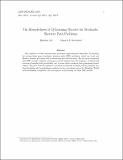| dc.contributor.author | Yu, Huizhen | |
| dc.contributor.author | Bertsekas, Dimitri P. | |
| dc.date.accessioned | 2015-02-03T19:18:36Z | |
| dc.date.available | 2015-02-03T19:18:36Z | |
| dc.date.issued | 2012-11 | |
| dc.date.submitted | 2012-04 | |
| dc.identifier.issn | 0364-765X | |
| dc.identifier.issn | 1526-5471 | |
| dc.identifier.uri | http://hdl.handle.net/1721.1/93744 | |
| dc.description.abstract | We consider a totally asynchronous stochastic approximation algorithm, Q-learning, for solving finite space stochastic shortest path (SSP) problems, which are undiscounted, total cost Markov decision processes with an absorbing and cost-free state. For the most commonly used SSP models, existing convergence proofs assume that the sequence of Q-learning iterates is bounded with probability one, or some other condition that guarantees boundedness. We prove that the sequence of iterates is naturally bounded with probability one, thus furnishing the boundedness condition in the convergence proof by Tsitsiklis [Tsitsiklis JN (1994) Asynchronous stochastic approximation and Q-learning. Machine Learn. 16:185–202] and establishing completely the convergence of Q-learning for these SSP models. | en_US |
| dc.description.sponsorship | United States. Air Force (Grant FA9550-10-1-0412) | en_US |
| dc.description.sponsorship | National Science Foundation (U.S.) (Grant ECCS-0801549) | en_US |
| dc.language.iso | en_US | |
| dc.publisher | Institute for Operations Research and the Management Sciences (INFORMS) | en_US |
| dc.relation.isversionof | http://dx.doi.org/10.1287/moor.1120.0562 | en_US |
| dc.rights | Creative Commons Attribution-Noncommercial-Share Alike | en_US |
| dc.rights.uri | http://creativecommons.org/licenses/by-nc-sa/4.0/ | en_US |
| dc.source | Prof. Bertsekas via Chris Sherratt | en_US |
| dc.title | On Boundedness of Q-Learning Iterates for Stochastic Shortest Path Problems | en_US |
| dc.type | Article | en_US |
| dc.identifier.citation | Yu, Huizhen, and Dimitri P. Bertsekas. “On Boundedness of Q-Learning Iterates for Stochastic Shortest Path Problems.” Mathematics of Operations Research 38, no. 2 (May 2013): 209–227. | en_US |
| dc.contributor.department | Massachusetts Institute of Technology. Department of Electrical Engineering and Computer Science | en_US |
| dc.contributor.department | Massachusetts Institute of Technology. Laboratory for Information and Decision Systems | en_US |
| dc.contributor.approver | Bertsekas, Dimitri P. | en_US |
| dc.contributor.mitauthor | Yu, Huizhen | en_US |
| dc.contributor.mitauthor | Bertsekas, Dimitri P. | en_US |
| dc.relation.journal | Mathematics of Operations Research | en_US |
| dc.eprint.version | Author's final manuscript | en_US |
| dc.type.uri | http://purl.org/eprint/type/JournalArticle | en_US |
| eprint.status | http://purl.org/eprint/status/PeerReviewed | en_US |
| dspace.orderedauthors | Yu, Huizhen; Bertsekas, Dimitri P. | en_US |
| dc.identifier.orcid | https://orcid.org/0000-0001-6909-7208 | |
| mit.license | OPEN_ACCESS_POLICY | en_US |
| mit.metadata.status | Complete | |
